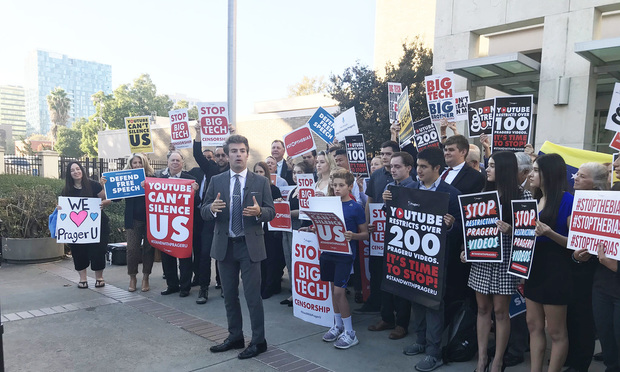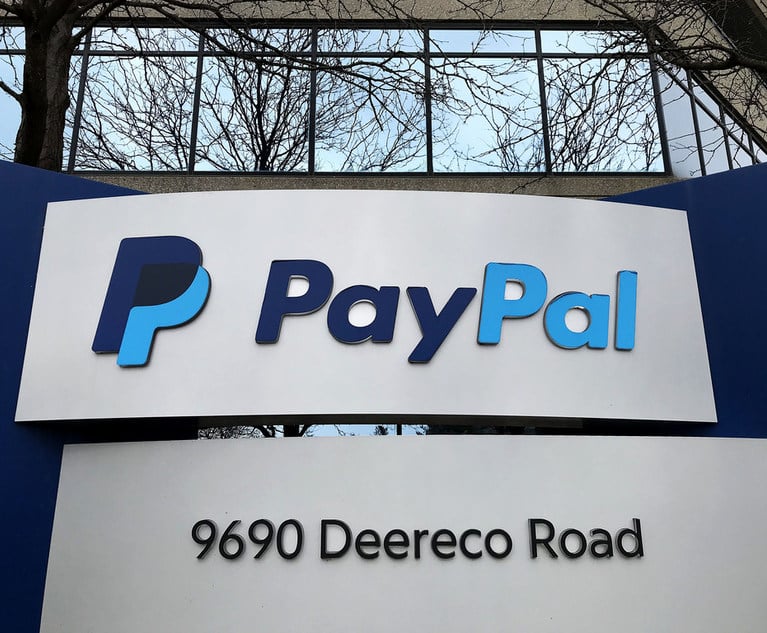Judge Poised to Knock Out PragerU's State Law Claims Against YouTube
Judge Brian Walsh of Santa Clara Superior Court wrote that he was not persuaded YouTube's unrestricted mode and advertising platform "are freely open to the public or are the functional equivalent of a traditional public forum like a town square or a central business district."
October 25, 2019 at 04:23 PM
6 minute read
 Prager University's YouTube videos.
Prager University's YouTube videos.
SAN JOSE—A California state court judge is poised to reject a conservative content creator's claims that YouTube functions as a public forum, and therefore, must protect free speech rights.
Prager University, a nonprofit founded by conservative media personality Dennis Prager, claimed YouTube's censorship policies violate California's Unruh Act, the Lanham Act, and the state constitution's speech and association statutes, according to the first amended complaint filed in May.
Before a completely full hearing Friday, Judge Brian Walsh of Santa Clara Superior Court issued a tentative ruling denying Prager's motion for preliminary injunction and dismissing without leave to amend.
Prager's lawyers at Browne George Ross had asked the court for a preliminary injunction to prohibit the platform from "capriciously restricting, demonetizing, or otherwise censoring" its uploads. Prager claimed YouTube's criteria for restricting videos, a designation that hides videos when institutions such as schools and workplaces turn on "Restricted Mode" and determines when videos can generate advertising revenue, is vague and overly broad. Limiting access to Prager videos constitutes a "state action" burdening the organization's free speech, Prager's counsel wrote in its motion for preliminary injunction.
In a tentative ruling issued before Friday's hearing, Walsh wrote that "it is apparent" that Prager does not state a claim under the California Constitution. "Prager contends that 'YouTube is the cyber equivalent of a town square where citizens exchange ideas on matters of public interest' and that defendants have opened their platform to the public by advertising its use for this purpose," he wrote. "However, Prager does not allege that it has been denied access to the core YouTube service."
Walsh wrote he was not persuaded that YouTube's unrestricted mode and advertising platform "are freely open to the public or are the functional equivalent of a traditional public forum like a town square or a central business district."
Prager claimed that YouTube has restricted or demonetized videos such as "Gender Identity: Why All the Confusion?" and "Radical Islam: The Most Dangerous Ideology."
In YouTube's notice of demurrer, the company's lawyers at Wilson Sonsini Goodrich & Rosati asserted that Section 230 of the Communications Decency Act as well as the company's First Amendment rights protect it from Prager's claims and allow the platform to make editorial decisions about its content.
PragerU argued that applying Section 230 in this case would disfigure the law. "Employing Section 230 as YouTube insists enabling it to suppress all speech for any reason or for no reason, however unlawful, insidious, or improper, would transform Section 230 from properly-tailored balancing of free speech interests into state court-enforced heckler's veto on constitutionally-protected speech, a clear Violation of the First Amendment," Prager's counsel wrote in support of its preliminary injunction.
Walsh, who attentively listened during the hearing and asked very few questions, decided that Prager did not back up its case for an exemption from Section 230 with relevant case law.
"While Prager contends that section 230(c)(1) immunity should not be applied where a plaintiff alleges a service provider acted in bad faith or to stifle competition, it cites no persuasive authority adopting this interpretation," the judge wrote.
Brown George Ross' Peter Obstler is also representing Prager in a federal case pending before the U.S. Court of Appeals for the Ninth Circuit, where he argued that YouTube's domination in online video grants it public forum status and the burden to protect free speech, similar to the "company town" premise formulated in the U.S. Supreme Court decision in Marsh v. Alabama.
The state court complaint notes another lawsuit Obstler has helped wage against YouTube. The hosts of LGBTQ news show "Glitter Bomb TV" sued YouTube in the U.S. District Court for the Northern District of California after its videos had been restricted and demonetized for "shocking" content.
"The same vague and discretionary content filters and regulations which discriminate against consumers based on sexual orientation of the speaker or their viewpoint is also applied to censor and financially harm other legitimate users and consumers based upon their political identity, religious beliefs and viewpoints, like PragerU," Prager's lawyers wrote.
Obstler said at Friday's hearing that the Glitter Bomb TV case is going to "push the limit on the CDA."
"If that court rules differently in that case, we're going to be back here," he told Walsh.
Ahead of the hearing, PragerU went on a press blitz. A crowd of young conservatives gathered Friday morning in front of the courthouse to tell YouTube that they cannot be silenced. Earlier in the week, Prager took its message on the road with a box truck playing PragerU's restricted videos that made pit stops in front of big tech company headquarters in Silicon Valley. The strategy seemed to pay off with every seat in the courtroom full, with more people waiting outside the courtroom and listening to PragerU's livestream on their phones.
 Protesters gather in front of the Superior Court of Santa Clara County in San Jose for a Prager University press conference. (Photo: Alaina Lancaster)
Protesters gather in front of the Superior Court of Santa Clara County in San Jose for a Prager University press conference. (Photo: Alaina Lancaster)In closing, Walsh said both sides had "excellent arguments."
"I don't like excellent arguments, because they make me have to think harder," he said.
He also thanked the audience for coming and for restoring his faith that people can be civil to one another.
If Walsh holds his tentative ruling, Obstler said in an interview after the hearing that he'll appeal the case to the Sixth District Court of Appeal.
This content has been archived. It is available through our partners, LexisNexis® and Bloomberg Law.
To view this content, please continue to their sites.
Not a Lexis Subscriber?
Subscribe Now
Not a Bloomberg Law Subscriber?
Subscribe Now
NOT FOR REPRINT
© 2025 ALM Global, LLC, All Rights Reserved. Request academic re-use from www.copyright.com. All other uses, submit a request to [email protected]. For more information visit Asset & Logo Licensing.
You Might Like
View All
Microsoft Becomes Latest Tech Company to Face Claims of Stealing Marketing Commissions From Influencers


TikTok Opts Not to Take Section 230 Immunity Fight to U.S. Supreme Court
4 minute read
PayPal Faces New Round of Claims; This Time Alleging Its 'Honey' Browser Extension Cheated Consumers
Trending Stories
Who Got The Work
J. Brugh Lower of Gibbons has entered an appearance for industrial equipment supplier Devco Corporation in a pending trademark infringement lawsuit. The suit, accusing the defendant of selling knock-off Graco products, was filed Dec. 18 in New Jersey District Court by Rivkin Radler on behalf of Graco Inc. and Graco Minnesota. The case, assigned to U.S. District Judge Zahid N. Quraishi, is 3:24-cv-11294, Graco Inc. et al v. Devco Corporation.
Who Got The Work
Rebecca Maller-Stein and Kent A. Yalowitz of Arnold & Porter Kaye Scholer have entered their appearances for Hanaco Venture Capital and its executives, Lior Prosor and David Frankel, in a pending securities lawsuit. The action, filed on Dec. 24 in New York Southern District Court by Zell, Aron & Co. on behalf of Goldeneye Advisors, accuses the defendants of negligently and fraudulently managing the plaintiff's $1 million investment. The case, assigned to U.S. District Judge Vernon S. Broderick, is 1:24-cv-09918, Goldeneye Advisors, LLC v. Hanaco Venture Capital, Ltd. et al.
Who Got The Work
Attorneys from A&O Shearman has stepped in as defense counsel for Toronto-Dominion Bank and other defendants in a pending securities class action. The suit, filed Dec. 11 in New York Southern District Court by Bleichmar Fonti & Auld, accuses the defendants of concealing the bank's 'pervasive' deficiencies in regards to its compliance with the Bank Secrecy Act and the quality of its anti-money laundering controls. The case, assigned to U.S. District Judge Arun Subramanian, is 1:24-cv-09445, Gonzalez v. The Toronto-Dominion Bank et al.
Who Got The Work
Crown Castle International, a Pennsylvania company providing shared communications infrastructure, has turned to Luke D. Wolf of Gordon Rees Scully Mansukhani to fend off a pending breach-of-contract lawsuit. The court action, filed Nov. 25 in Michigan Eastern District Court by Hooper Hathaway PC on behalf of The Town Residences LLC, accuses Crown Castle of failing to transfer approximately $30,000 in utility payments from T-Mobile in breach of a roof-top lease and assignment agreement. The case, assigned to U.S. District Judge Susan K. Declercq, is 2:24-cv-13131, The Town Residences LLC v. T-Mobile US, Inc. et al.
Who Got The Work
Wilfred P. Coronato and Daniel M. Schwartz of McCarter & English have stepped in as defense counsel to Electrolux Home Products Inc. in a pending product liability lawsuit. The court action, filed Nov. 26 in New York Eastern District Court by Poulos Lopiccolo PC and Nagel Rice LLP on behalf of David Stern, alleges that the defendant's refrigerators’ drawers and shelving repeatedly break and fall apart within months after purchase. The case, assigned to U.S. District Judge Joan M. Azrack, is 2:24-cv-08204, Stern v. Electrolux Home Products, Inc.
Featured Firms
Law Offices of Gary Martin Hays & Associates, P.C.
(470) 294-1674
Law Offices of Mark E. Salomone
(857) 444-6468
Smith & Hassler
(713) 739-1250






